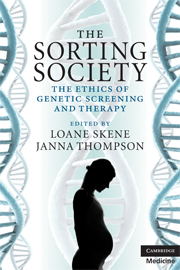Book contents
- Frontmatter
- Contents
- List of contributors
- Preface
- 1 Introduction
- 2 Genetic testing, an informed choice
- 3 Sex selection: sorting sperm as a gateway to the sorting society?
- 4 Cloning to avoid genetic disease
- 5 Procreative Beneficence: reasons to not have disabled children
- 6 Reprogenetic technologies: balancing parental procreative autonomy and social equity and justice
- 7 Genetic technology and intergenerational justice
- 8 Genetic preselection and the moral equality of individuals
- 9 Genes, identity and the ‘expressivist critique’
- 10 Overstating the biological: geneticism and essentialism in social cloning and social sex selection
- 11 The sorting society: a legal perspective
- Index
- References
9 - Genes, identity and the ‘expressivist critique’
Published online by Cambridge University Press: 16 September 2009
- Frontmatter
- Contents
- List of contributors
- Preface
- 1 Introduction
- 2 Genetic testing, an informed choice
- 3 Sex selection: sorting sperm as a gateway to the sorting society?
- 4 Cloning to avoid genetic disease
- 5 Procreative Beneficence: reasons to not have disabled children
- 6 Reprogenetic technologies: balancing parental procreative autonomy and social equity and justice
- 7 Genetic technology and intergenerational justice
- 8 Genetic preselection and the moral equality of individuals
- 9 Genes, identity and the ‘expressivist critique’
- 10 Overstating the biological: geneticism and essentialism in social cloning and social sex selection
- 11 The sorting society: a legal perspective
- Index
- References
Summary
Introduction
Technologies such as prenatal testing, combined with the option of abortion, and pre-implantation genetic diagnosis now give prospective parents unprecedented power to choose the genetics of their children. In effect, they allow parents to sort embryos according to whether they have desirable or undesirable genes. A society in which such technologies become widespread – as they have in many industrialized nations already – might be thought of as a ‘sorting society’. This description, however, immediately draws attention to another, more disturbing, potential in these technologies. Critics of the sorting society worry that it involves choosing between different ‘sorts’ of people, deciding who will be born on the basis of a belief that some sorts of people are better than others.
The shameful historical legacy of racial eugenics has meant that there is little open enthusiasm for using modern technologies of genetic selection to select for (supposed) racial traits. While technologies enabling sex selection have been widely adopted to that purpose, their use in this fashion has, I think, at least as many critics as admirers amongst those writing about the ethics of this practice. Instead, these sorting technologies have been taken up and defended most enthusiastically in the service of the goal of preventing the birth of children who might suffer from various disabilities. As a result, it has been critics from within the disability community who have thought hardest about – and have raised some of the most forceful objections to – the development of the sorting society.
- Type
- Chapter
- Information
- The Sorting SocietyThe Ethics of Genetic Screening and Therapy, pp. 111 - 132Publisher: Cambridge University PressPrint publication year: 2008
References
- 7
- Cited by

